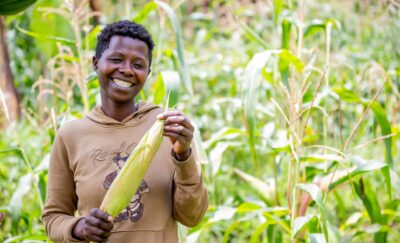News
18 January 2013
Counting on cassava in South Sudan

Farmers on one of our projects in South Sudan are beginning to reap huge rewards after planting a new variety of fast-growing cassava introduced by Farm Africa.
The farmers’ success with the new cassava is down to a huge amount of hard work they put into training sessions with us in early 2012. Training focused on preparing land, managing cuttings, best planting techniques and weeding.
Effective land preparation
The farmers also learned the skill of choosing the right piece of land, which for cassava means loamy soil that has been allowed to rest for at least two years. Land must not slope as it needs to be water logged; nor can it be in the shade which prevents growth.
Also high on the agenda was the importance for cassava of intercropping – planting it in between other fast growing crops like peanuts or okra – as well as good spacing between plants, and regular weeding.
To ensure the farmers had the best chance of success Farm Africa provided basic tools that we would take for granted in the UK: axes, sickles, hoes, slashers and pangas have made all the difference in helping farmers to prepare their land quickly and easily so they are ready for the rains.
Dramatic results
The results have been dramatic. Cassava yields have rocketed with some farmers producing an astonishing 32 tonnes per acre, remarkable when you consider that the national average is just 0.2 tonnes per acre!
These advances are life-changing for farmers who are now able to put more food on more plates for more of the year. Farmers taking part in the project have seen the average period where there is little to eat cut in half – from six months to three months a year.
Their success has not been lost on their fellow villagers. Cuttings of the new cassava variety are now in high demand at local markets from people who have seen the transformation in the fields of the Farm Africa-trained farmers.
Read a BBC report on how cassava is helping African farmers cope with the effects of climate change.




